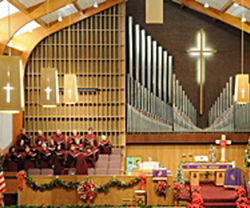 Since my decision actually to describe the peripatetic nature of my 50-year ministry, commensurate with the title of this blog, I have reflected on past preaching/teaching trips to Fiji, Japan, and Israel. I will return to more exotic sites in future, but today I describe a journey that lasted two years, and began now 43 years ago. It was my first foray into pastoral ministry, and it began in Lake Charles, LA. I admit freely that I went to Lake Charles kicking and screaming. I had spent 24 straight years in one school or another, was branded with a PhD, and was prepared to teach some group or other who would have me. No one would have me, despite the over 300 applications I mailed, and despite rather glowing recommendations from faculty, clergy, and other friends. Surely, I would be hired somewhere! It was not to be.
Since my decision actually to describe the peripatetic nature of my 50-year ministry, commensurate with the title of this blog, I have reflected on past preaching/teaching trips to Fiji, Japan, and Israel. I will return to more exotic sites in future, but today I describe a journey that lasted two years, and began now 43 years ago. It was my first foray into pastoral ministry, and it began in Lake Charles, LA. I admit freely that I went to Lake Charles kicking and screaming. I had spent 24 straight years in one school or another, was branded with a PhD, and was prepared to teach some group or other who would have me. No one would have me, despite the over 300 applications I mailed, and despite rather glowing recommendations from faculty, clergy, and other friends. Surely, I would be hired somewhere! It was not to be.
After exhausting all teaching avenues I knew, I trudged over to the graduate office at my school, and poured out my plight to the wonderful secretary who always had a listening heart. “My wife is pregnant,” I wailed, “and my fellowship money has run out. What am I to do?” She might have said, “Get a job, like the rest of us, you lazy, privileged so-and-so,” but she did not. Instead, she told me that the Bishop in Residence (Methodist, not RC) had just been in her office, asking if any student might be available for an associate pastor’s job in Louisiana. I had nothing else, I thought, so I walked to his office, however slowly and reluctantly. He put me in contact with the senior pastor of the University United Methodist Church in Lake Charles, and he and I quickly arranged for a face-to-face meeting with the Pastor-Parish Relations Committee.
 I flew to the tiny airport from Dallas, and Kenneth Reed met me at the plane. We hopped in his car, and he drove (I do not exaggerate) 70 miles an hour through residential streets, careening from light to light and sign to sign, until we skidded into the church parking lot. I had my one poor suit on and was ushered into the meeting room. After the usual introductions and brief small talk the chair of the committee, Gillis McFillen, a man with an eighth grade education who had made his career in used and rental cars, asked me this question. “So, you have a PhD, do you?” I nodded, not being able to deny all those years of my nose in multiple tomes. “Do you think you can talk to people like me?” It was an extremely good question, and one that has rested in the back of my skull since. Could I in fact with all my knowledge speak to people in ways they could apprehend, communicating to them the love I felt for the Bible and its traditions? I answered Gillis far too easily with a positive reply, but deep down I did not know whether I could do what he asked. “That’s good enough for me,” he said, and I was hired on the spot. Obviously, this church was desperate! I knew a great deal about the Hebrew Bible, and especially a great deal about its book of Job, but about the actual church of Jesus Christ I knew precious little. I had been to one funeral in my life, had never witnessed a baptism, had served on no church committees, and had preached a few sermons (many of which were in the Madison Junction campground in Yellowstone National Park—I will write of that in a future blog). But I was as green as the summer grass.
I flew to the tiny airport from Dallas, and Kenneth Reed met me at the plane. We hopped in his car, and he drove (I do not exaggerate) 70 miles an hour through residential streets, careening from light to light and sign to sign, until we skidded into the church parking lot. I had my one poor suit on and was ushered into the meeting room. After the usual introductions and brief small talk the chair of the committee, Gillis McFillen, a man with an eighth grade education who had made his career in used and rental cars, asked me this question. “So, you have a PhD, do you?” I nodded, not being able to deny all those years of my nose in multiple tomes. “Do you think you can talk to people like me?” It was an extremely good question, and one that has rested in the back of my skull since. Could I in fact with all my knowledge speak to people in ways they could apprehend, communicating to them the love I felt for the Bible and its traditions? I answered Gillis far too easily with a positive reply, but deep down I did not know whether I could do what he asked. “That’s good enough for me,” he said, and I was hired on the spot. Obviously, this church was desperate! I knew a great deal about the Hebrew Bible, and especially a great deal about its book of Job, but about the actual church of Jesus Christ I knew precious little. I had been to one funeral in my life, had never witnessed a baptism, had served on no church committees, and had preached a few sermons (many of which were in the Madison Junction campground in Yellowstone National Park—I will write of that in a future blog). But I was as green as the summer grass.
I flew back to Dallas, informed my wife that we were moving to Louisiana. And after Darius, our son was born, I drive down to Lake Charles with our few possessions and our crazy dog, Nebuchadnezzar, while Diana flew down with our 10-day-old son in her arms. It was all quite mad somehow, and hardly what I thought I would be doing with my life. We moved into the parsonage, settled in as well as we could, and I went to work. And work I did! 80 to 90 hours each week, visiting, visiting, visiting in hospitals, nursing homes, homes of those I did not know, and homes of those I knew only slightly. Meanwhile, my wife, who had a Master’s degree in music, was trapped at home with an increasingly active baby.
Any number of stories I could relate about our personal struggles, (and my wife could add some too!) but the point of my writing today has to do with what happened to me during my two years in that church. I became much more of a human being, something I did not know I needed to be, but after the experience ended something I now saw as thoroughly invaluable. One story stands out that makes this point.
 My senior pastor was a colonel in the National Guard, and every summer had to spend two weeks with a unit to fulfill his responsibilities. Less than a month after my arrival, he left for his tour, and I was left to run the church, which at the time had about 1400 members. I was in my office, very much alone, one morning when the church phone rang, and the call was transferred to me. The elderly woman on the line, obviously in great distress, begged me to come to her home; something terrible had happened, something she would not reveal over the phone. I hopped into my old green dented Chevy Impala and rushed to her address. As she invited me in, she was weeping uncontrollably. “It is my grandson,” she cried. “He’s in there,” and she pointed to a room with a closed door. She led me over to the door and opened it. The sight I saw is imprinted on my brain to this day. Her grandson was slumped on the floor, covered in blood, the top of his head blown away by a shotgun that had fallen from his hands. His brains were splattered on the wall behind his rumpled bed. He was obviously dead, and had just as obviously killed himself.
My senior pastor was a colonel in the National Guard, and every summer had to spend two weeks with a unit to fulfill his responsibilities. Less than a month after my arrival, he left for his tour, and I was left to run the church, which at the time had about 1400 members. I was in my office, very much alone, one morning when the church phone rang, and the call was transferred to me. The elderly woman on the line, obviously in great distress, begged me to come to her home; something terrible had happened, something she would not reveal over the phone. I hopped into my old green dented Chevy Impala and rushed to her address. As she invited me in, she was weeping uncontrollably. “It is my grandson,” she cried. “He’s in there,” and she pointed to a room with a closed door. She led me over to the door and opened it. The sight I saw is imprinted on my brain to this day. Her grandson was slumped on the floor, covered in blood, the top of his head blown away by a shotgun that had fallen from his hands. His brains were splattered on the wall behind his rumpled bed. He was obviously dead, and had just as obviously killed himself.
His distraught grandma was more intent on cleaning that wall of his brain matter than anything else, so I asked her where she kept her cleaning supplies and helped her begin that grisly task. I then called the police and an ambulance, and rejoined her in the room, grabbing a cloth to help her. And she and I, trying to avoid her grandson and his blood, cleaned that wall together. It was what she could do for him, she said; she did not wish anyone to see his brain splashed on her wall, a fact she repeated to me again and again.
I stayed with her for some hours, during the arrival of the police, the coming of the ambulance, and the removal of the body of her grandson. He was nineteen, she told me, deeply depressed, changing from sullen silences to raging anger in an instant. His parents had long before quit the struggle, and had handed him over to her. She had done her best, but he would not take his medication, would not see the doctor regularly, was not finally thankful to her or to anyone else for the state of his life. It had all been too much, and he had done what he often had threatened to do.
I conducted his funeral, my first, in front of his grandmother, his mother, who had not seen him in several years. His father refused to attend, having divorced his wife some years before. There were a pitiful number of congregants that day. Several days of all this left me drained and wondering about this ministry thing. Could I actually do this work? Was I human enough to do what the job demanded? As horrible as that experience was, and as shocking and appalling as it all was at the time, I know now that this event set me on the road to a fuller humanness. In no other way could I have moved from the “pure” life of the mind to the lives of real people. Well, I might have made that move, but in Lake Charles, LA I was dragged and wrenched into the world of my fellow creatures, and I dealt with many I would never have confronted in my classrooms and faced countless experiences that no university can provide.
I am more grateful for those two years among the people of Lake Charles than I can ever express. Indeed, they taught me far more than I ever taught them. Oh, I imparted to them many fine nuggets from my rich store of Bible knowledge, but they offered to me, that 28-year-old me, lessons in compassion and joy and sadness and hope that books alone can never provide. I have visited that church on several occasions since to preach and to teach, and each time I go upon seeing that sanctuary just off one of the main streets of the city, I raise again a prayer of thanks for all I learned there. Whatever I have become as a follower of God began in earnest in that sacred space.











